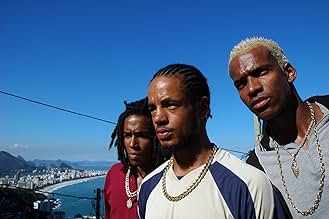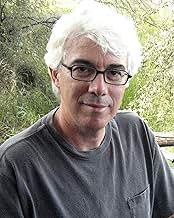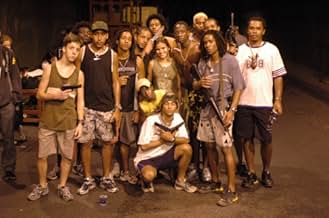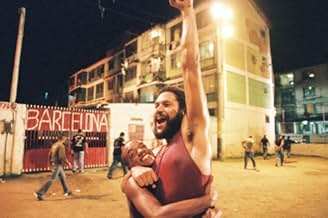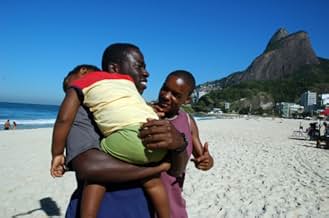NOTE IMDb
7,2/10
17 k
MA NOTE
Ajouter une intrigue dans votre langueBest buddies Acerola and Laranjinha, about to turn 18, discover things about their missing fathers' pasts which will shatter their solid friendship, in the middle of a war between rival drug... Tout lireBest buddies Acerola and Laranjinha, about to turn 18, discover things about their missing fathers' pasts which will shatter their solid friendship, in the middle of a war between rival drug gangs from Rio's favelas.Best buddies Acerola and Laranjinha, about to turn 18, discover things about their missing fathers' pasts which will shatter their solid friendship, in the middle of a war between rival drug gangs from Rio's favelas.
- Récompenses
- 14 nominations au total
Naima Silva
- Camila
- (as Naíma Silva)
Eduardo 'BR' Piranha
- Nefasto
- (as Eduardo BR)
Histoire
Le saviez-vous
- AnecdotesJonathan Haagensen, Mumuzinho and Thiago Martins are some of the actors returning after La cité de Dieu (2002), portraying new roles.
- GaffesWhen Camila is showing Wallace her hair and telling him where Ace is, a leg of the tripod holding the close up camera is visible on the right side in the wide shot of them.
- Bandes originalesFlor E O Espinho
(uncredited)
Written by Nelson Cavaquinho, Guilherme de Brito and Alcides Caminha
Originally recorded by Paulinho Moska
Sung by Rodrigo dos Santos (Heraldo) in the shower
Commentaire à la une
It has been estimated that 19 percent of the population of Rio de Janeiro live in favelas, shanties crowded onto hillsides not far from luxurious apartments and world famous beach resorts. Notorious breeding grounds for poverty, drug addiction, and gang warfare, the favelas with their picturesque street names such as Dead End Hill, have been the subject of critically acclaimed films such as Hector Babenco's Pixote and Fernando Meirelles' City of God. Based on a long running television series that ran on Brazilian TV Globo for four years and was watched by 35 million viewers, Paolo Morelli's City of Men is a follow-up to the more flashy Meirelles film. While it lacks the earlier work's kinetic energy, it is more emotionally satisfying and has characters that we care about.
The film focuses on two friends, both turning 18 and without fathers. The two boys, Acerola and Laranjinha, (given Americanized names Ace and Wallace in the subtitles) have unresolved father issues. Wallace is trying to locate the father he never knew and Ace wants to find out how and why his father was killed. Actors Douglas Silva and Darlan Cunha both appeared in the TV series and footage from the TV series is used for flashbacks in the film, shown in a faded color palette. Both are natural actors who do a remarkable job. Ace, though only 18, lives with his wife Cris (Camilla Monteiro) in one of the shanties and is the father of a young boy named Clayton (Vinicius Oliveira). Ace is immature enough to leave Clayton alone on the beach in an early sequence but must grow up quickly and assume complete responsibility for Clayton's care when Cris takes a job in Sao Paolo.
Shot by cinematographer Adriano Goldman who provides sweeping panoramas of the hills, mountains, and beaches, the film begins on the top of Dead End Hill on a day so brutally hot I could feel the sweat gathering on my forehead. Gang members with handguns and automatic weapons led by Midnight (Jonathan Haagensen) decide to head down to the ocean, establishing a perimeter of guards who tell the cops that they are on route. The emotional center of the film is the relationship between Wallace and his newly discovered father Heraldo played with strength and dignity by Rodrigo Dos Santos. Heraldo is out on parole after having served fifteen years of a twenty year sentence for robbery and murder. The circumstances of the murder that he committed becomes a central issue in the relationship between Ace and Wallace and secrets about both of their fathers' pasts threaten their friendship and lead to their involvement on different sides of a new eruption of gang violence.
Somewhat melodramatic but never manipulative or false, City of Men transcends the familiar format of hand-held camera hyperactivity and gangster clichés to become a tender and deeply affecting story about abandoned children and how the cycle is repeated from one generation to the next. While the film explodes into warfare between rival gangs led by Midnight and Fasto (Eduardo BR), it is devoid of typical heavily stylized and frenetic violence. Ace and Wallace are characters we get to know and identify with. We want them to defy the odds and survive until adulthood though the tragic history of life in the Rio slums is never far from our mind.
The film focuses on two friends, both turning 18 and without fathers. The two boys, Acerola and Laranjinha, (given Americanized names Ace and Wallace in the subtitles) have unresolved father issues. Wallace is trying to locate the father he never knew and Ace wants to find out how and why his father was killed. Actors Douglas Silva and Darlan Cunha both appeared in the TV series and footage from the TV series is used for flashbacks in the film, shown in a faded color palette. Both are natural actors who do a remarkable job. Ace, though only 18, lives with his wife Cris (Camilla Monteiro) in one of the shanties and is the father of a young boy named Clayton (Vinicius Oliveira). Ace is immature enough to leave Clayton alone on the beach in an early sequence but must grow up quickly and assume complete responsibility for Clayton's care when Cris takes a job in Sao Paolo.
Shot by cinematographer Adriano Goldman who provides sweeping panoramas of the hills, mountains, and beaches, the film begins on the top of Dead End Hill on a day so brutally hot I could feel the sweat gathering on my forehead. Gang members with handguns and automatic weapons led by Midnight (Jonathan Haagensen) decide to head down to the ocean, establishing a perimeter of guards who tell the cops that they are on route. The emotional center of the film is the relationship between Wallace and his newly discovered father Heraldo played with strength and dignity by Rodrigo Dos Santos. Heraldo is out on parole after having served fifteen years of a twenty year sentence for robbery and murder. The circumstances of the murder that he committed becomes a central issue in the relationship between Ace and Wallace and secrets about both of their fathers' pasts threaten their friendship and lead to their involvement on different sides of a new eruption of gang violence.
Somewhat melodramatic but never manipulative or false, City of Men transcends the familiar format of hand-held camera hyperactivity and gangster clichés to become a tender and deeply affecting story about abandoned children and how the cycle is repeated from one generation to the next. While the film explodes into warfare between rival gangs led by Midnight and Fasto (Eduardo BR), it is devoid of typical heavily stylized and frenetic violence. Ace and Wallace are characters we get to know and identify with. We want them to defy the odds and survive until adulthood though the tragic history of life in the Rio slums is never far from our mind.
- howard.schumann
- 2 mars 2008
- Permalien
Meilleurs choix
Connectez-vous pour évaluer et suivre la liste de favoris afin de recevoir des recommandations personnalisées
Détails
Box-office
- Montant brut aux États-Unis et au Canada
- 325 131 $US
- Week-end de sortie aux États-Unis et au Canada
- 130 579 $US
- 2 mars 2008
- Montant brut mondial
- 2 589 732 $US
- Durée1 heure 46 minutes
- Couleur
- Mixage
- Rapport de forme
- 1.85 : 1
Contribuer à cette page
Suggérer une modification ou ajouter du contenu manquant

Lacune principale
By what name was La cité des hommes (2007) officially released in India in English?
Répondre

![City Of Men [Cidade dos Homens]](https://m.media-amazon.com/images/M/MV5BMTIyMzgyNTUyMl5BMl5BanBnXkFtZTcwMzQ2NTc3MQ@@._V1_QL75_UX500_CR0)



